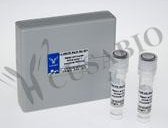HSPA1A Antibody, HRP conjugatedСпецификация| Объем | 100 мкг | | Синонимы | Heat shock 70 kDa protein 1A (Heat shock 70 kDa protein 1) (HSP70-1) (HSP70.1), HSPA1A, HSP72 HSPA1 HSX70 | | Клональность | Polyclonal Antibody | | Организм | Human | | uniprot | P0DMV8 | | Иммуноген | Recombinant Human Heat shock 70 kDa protein 1A protein (418-512AA) | | Источник | Rabbit | | Видовая специфичность | Human | | Применение | ELISA | | Примечание | Molecular chaperone implicated in a wide variety of cellular processes, including protection of the proteome from stress, folding and transport of newly synthesized polypeptides, activation of proteolysis of misfolded proteins and the formation and dissociation of protein complexes. Plays a pivotal role in the protein quality control system, ensuring the correct folding of proteins, the re-folding of misfolded proteins and controlling the targeting of proteins for subsequent degradation. This is achieved through cycles of ATP binding, ATP hydrolysis and ADP release, mediated by co-chaperones. The co-chaperones have been shown to not only regulate different steps of the ATPase cycle, but they also have an individual specificity such that one co-chaperone may promote folding of a substrate while another may promote degradation. The affinity for polypeptides is regulated by its nucleotide bound state. In the ATP-bound form, it has a low affinity for substrate proteins. However, upon hydrolysis of the ATP to ADP, it undergoes a conformational change that increases its affinity for substrate proteins. It goes through repeated cycles of ATP hydrolysis and nucleotide exchange, which permits cycles of substrate binding and release. The co-chaperones are of three types: J-domain co-chaperones such as HSP40s (stimulate ATPase hydrolysis by HSP70), the nucleotide exchange factors (NEF) such as BAG1/2/3 (facilitate conversion of HSP70 from the ADP-bound to the ATP-bound state thereby promoting substrate release), and the TPR domain chaperones such as HOPX and STUB1 (PubMed:24012426, PubMed:26865365, PubMed:24318877). Maintains protein homeostasis during cellular stress through two opposing mechanisms: protein refolding and degradation. Its acetylation/deacetylation state determines whether it functions in protein refolding or protein degradation by controlling the competitive binding of co-chaperones HOPX and STUB1. During the early stress response, the acetylated form binds to HOPX which assists in chaperone-mediated protein refolding, thereafter, it is deacetylated and binds to ubiquitin ligase STUB1 that promotes ubiquitin-mediated protein degradation (PubMed:27708256). Regulates centrosome integrity during mitosis, and is required for the maintenance of a functional mitotic centrosome that supports the assembly of a bipolar mitotic spindle (PubMed:27137183). Enhances STUB1-mediated SMAD3 ubiquitination and degradation and facilitates STUB1-mediated inhibition of TGF-beta signaling (PubMed:24613385). Essential for STUB1-mediated ubiquitination and degradation of FOXP3 in regulatory T-cells (Treg) during inflammation (PubMed:23973223). Negatively regulates heat shock-induced HSF1 transcriptional activity during the attenuation and recovery phase period of the heat shock response (PubMed:9499401). | | Клональность1 | Polyclonal | | Изотип | IgG | | Коньюгат | HRP | | Буффер | Preservative: 0.03% Proclin 300<br />Constituents: 50% Glycerol, 0.01M PBS, pH 7.4 | | Форма | Liquid | | Хранение | Upon receipt, store at -20°C or -80°C. Avoid repeated freeze. | | Метод очистки | >95%, Protein G purified | | Абревеатура | Heat shock 70 kDa protein 1A | | Области исследований | Others | | Ссылка на страницу на сайте производителя | ссылка | | | |
Информация для заказа| Область использования: | Производство: | Cusabio | | Метод: | Антитела | | Объем: | 100 мкг | | Кат. номер: | CSB-PA10899B0Rb | | Цена (с НДС 20%): | по запросу | В корзину  |  Наименование: HSPA1A Antibody, HRP conjugated. Наименование: HSPA1A Antibody, HRP conjugated.
Примечание: дополнительная информация (на английском языке). |
|
